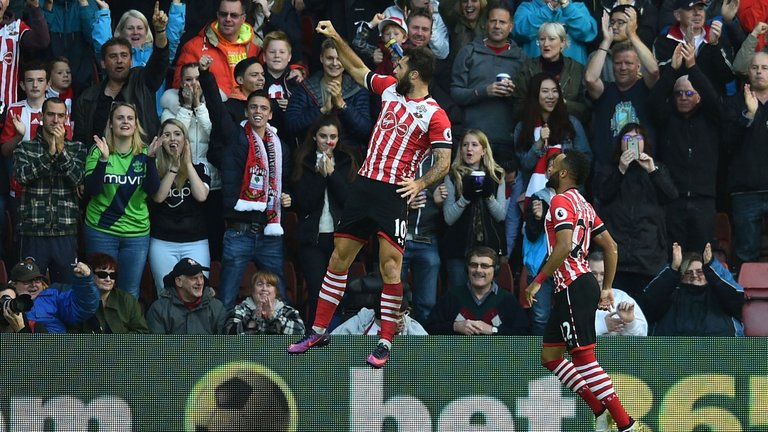For years, Swansea were held up as the model Premier League club by experts and fans alike, however things have not been looking quite so rosy of late. Meanwhile, Southampton seem to be quietly going about their business and winning plaudits for their excellent continuity plans. Just what makes a model club anyway?
When it comes to football, especially at the highest levels in England, money is king. Like it or not, money can often buy you a Premier League title, and as is often the case, victory results in more money flooding into the most successful clubs. In reality, money makes the footballing world go round, but sometimes a club rises up and breaks the mould.
Turning Water into Wine: Swansea Toasting Success on a Budget

Although cash-rich clubs like Manchester City, Arsenal, Chelsea and Manchester United still dominate the top flight, recent years have seen clubs like Swansea perform minor miracles on a comparatively meagre budget. According to the 2014 Price of Football study, Swansea were deemed a “model” club thanks to their approach to ticket pricing. Instead of creating a huge disparity between the “best” tickets and the “worst”, Swansea’s price structure was, essentially, flat.
At the time, the most expensive season ticket was £499 while the least expensive was just £70 less at £429. In contrast, Wales’ other top team, Cardiff were charging £689 for their top season tickets and £320 for the cheapest. However, despite having some of the lowest ticket prices in the Premier League and an annual wage bill of just £63 million in 2015 (for comparison Man City’s 2015 wage bill was £193 million), Swansea have managed to hang with the big boys.
After graduating from the Championship in 2011, the Swans finished 11th in their first season and have since managed to hover around that mark. This success has been in spite of the current trend in football for spending vast sums of money on wages, players, kits and stadiums. Although the Premier League is unlikely to ever follow the German system of fans owning a large percentage of their clubs to help keep prices low, Swansea have so far managed to prove it is possible here in the UK by making a success out of following this model.
Saints Answer Fans Prayers by Performing Swansea-Style Miracles
Unfortunately, the 2016-2017 Premier League season hasn’t been as forgiving for the Swans. After nine games the Welsh wizards were languishing in 19th place, and many have since questioned how strong the club’s “budget football” model really is. Indeed, five points from a possible 27 is poor by any club’s standards, but is there a new cut-price player in town?
According to the latest Premier League betting odds, Southampton are 25/1 to finish in the top four. Compare that to the 500/1 price tag odds makers have stuck on Swansea, and it’s easy to see why many people are now calling the Saints the new Swans.
Delving further into the numbers, Southampton’s highest paid players are currently earning £55,000-a-week. Despite being a staggering amount of money, that figure is markedly lower than the £290,000-a-week fee Man United’s Paul Pogba commands. Overall, Southampton’s annual wage bill is a capped at £59.5 million which, interestingly, isn’t far off Swansea’s £63 million total.
For this comparatively meagre spend, Claude Puel has managed to lift Southampton to ninth in the Premier League after nine games. In fact, when you look at the league stats a little closer, the side’s 11 goals for is only two shy of Man United, Everton and Tottenham. Given this early rush of success, it’s easy to see why the Saints are now starting to attract some money in the sports betting world.
However, while it’s clear that money doesn’t necessarily have to buy success in the Premier League, the question remains: how are teams like Swansea and Southampton managing to defy the odds? The romantic answer would be: heart and desire. As Leicester City showed last season, teamwork and determination can often make up for a lack of world-class individual talent.
Playing for the Fans is a Winning Formula
While this is likely part of the reason why smaller clubs on a budget can compete in the Premier League, there has to be something else. In one sense, it’s possible to say it’s the fans that have pushed Swansea to unthinkable heights. Affordable ticket prices means the Liberty Stadium is always packed to its 21,000 capacity. Having that many passionate fans – as opposed to rich men in suits with corporate seats – has to have a positive effect on the players.
However, the fans have also been influential in a more direct sense. Thanks to Chairman Huw Jenkins’ decision to sell shares to fans, the team now feels a debt of gratitude to the their supporters. Instead of playing for a faceless billionaire who is probably on a yacht somewhere on the other side of the world, Swansea’s players are faced with their shareholders each time they step on the pitch.
This, in essence, is a return to football and how it used to be. Before money and business became the name of the game, players were actually playing for the fans. Yes, it’s fair to say that there’s still a whiff of the corporate world at clubs like Swansea and Southampton, but it’s a far less intrusive odour than it is at places like Chelsea.
So, while it might be fair to say that the Saints are the new Swans this season, it doesn’t really matter because both clubs are setting a standard. By refusing to bow down to ridiculous wages and staying true to the fans, both clubs have still achieved a huge amount of success, and that should serve as a lesson to anyone in the game.